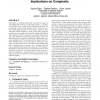Free Online Productivity Tools
i2Speak
i2Symbol
i2OCR
iTex2Img
iWeb2Print
iWeb2Shot
i2Type
iPdf2Split
iPdf2Merge
i2Bopomofo
i2Arabic
i2Style
i2Image
i2PDF
iLatex2Rtf
Sci2ools
107
click to vote
ATAL
2006
Springer
2006
Springer
Agent interaction in distributed POMDPs and its implications on complexity
The ability to coordinate effectively is critical for agents to accomplish their goals in a multi-agent system. A number of researchers have modeled the coordination problem for multi-agent systems using decision theory. The most general models have proven to be extremely complex to solve optimally (NEXP-complete). Some of the more restricted models have been much more tractable, though still difficult (NP-complete). What is missing is an understanding about why some models are much easier than others. This work fills this gap by providing a condition that distinguishes between problems in NP and those strictly harder than NP. This condition relates to the quantity of information each agent has about the others, and whether this information can be represented in a succinct way. We show that the class of problems that satisfy this condition is NP-complete. We illustrate this idea with two interaction protocols that satisfy the condition. For those problems that do not satisfy this cond...
Related Content
| Added | 20 Aug 2010 |
| Updated | 20 Aug 2010 |
| Type | Conference |
| Year | 2006 |
| Where | ATAL |
| Authors | Jiaying Shen, Raphen Becker, Victor R. Lesser |
Comments (0)

